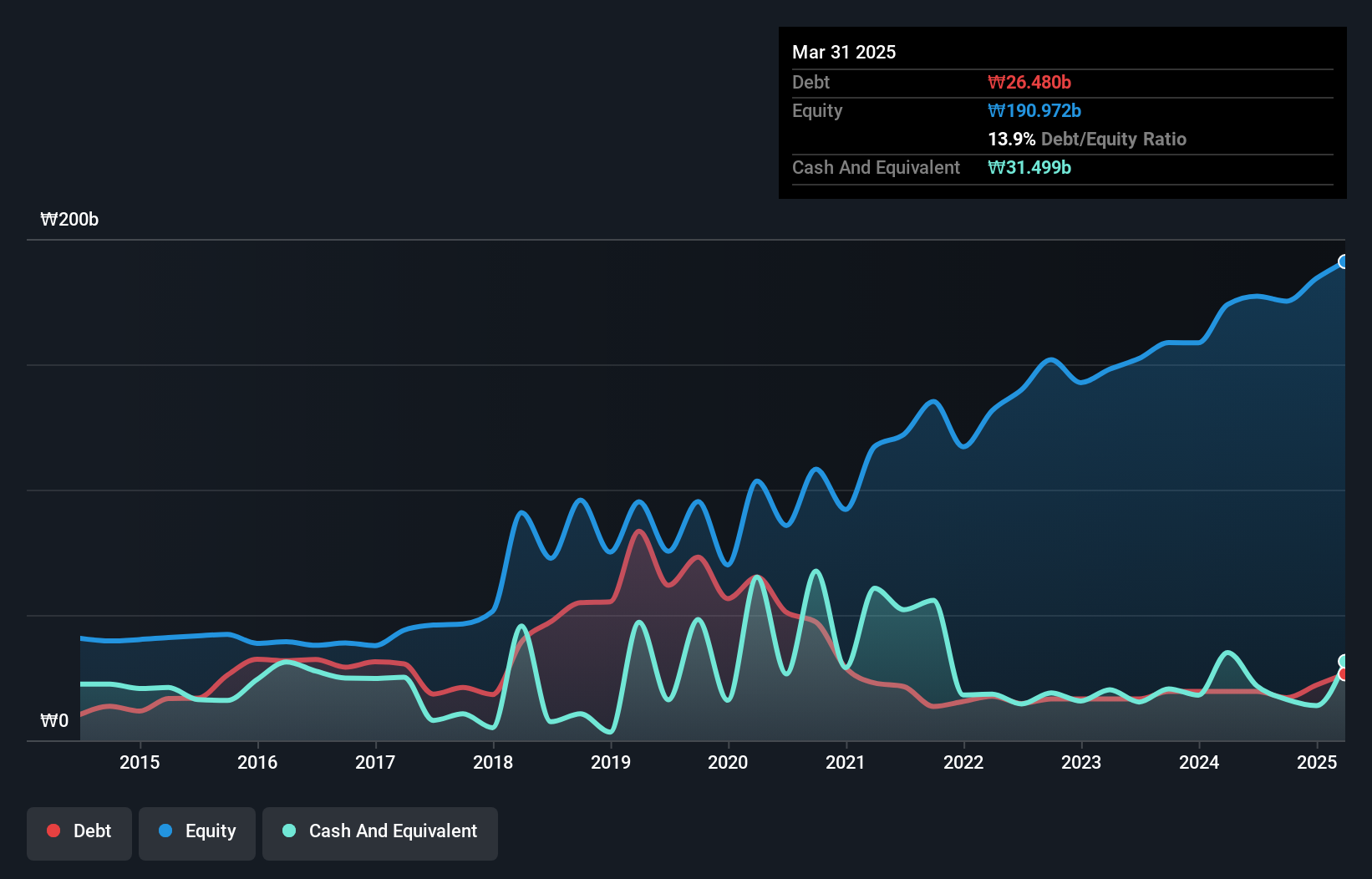- South Korea
- /
- Semiconductors
- /
- KOSDAQ:A080220
Jeju Semiconductor (KOSDAQ:080220) Seems To Use Debt Quite Sensibly
Some say volatility, rather than debt, is the best way to think about risk as an investor, but Warren Buffett famously said that 'Volatility is far from synonymous with risk.' So it might be obvious that you need to consider debt, when you think about how risky any given stock is, because too much debt can sink a company. We can see that Jeju Semiconductor Corp. (KOSDAQ:080220) does use debt in its business. But is this debt a concern to shareholders?
What Risk Does Debt Bring?
Generally speaking, debt only becomes a real problem when a company can't easily pay it off, either by raising capital or with its own cash flow. Ultimately, if the company can't fulfill its legal obligations to repay debt, shareholders could walk away with nothing. However, a more common (but still painful) scenario is that it has to raise new equity capital at a low price, thus permanently diluting shareholders. Of course, plenty of companies use debt to fund growth, without any negative consequences. The first step when considering a company's debt levels is to consider its cash and debt together.
How Much Debt Does Jeju Semiconductor Carry?
The image below, which you can click on for greater detail, shows that at March 2025 Jeju Semiconductor had debt of ₩26.5b, up from ₩19.5b in one year. However, it does have ₩31.5b in cash offsetting this, leading to net cash of ₩5.02b.

How Healthy Is Jeju Semiconductor's Balance Sheet?
Zooming in on the latest balance sheet data, we can see that Jeju Semiconductor had liabilities of ₩37.8b due within 12 months and liabilities of ₩8.07b due beyond that. Offsetting these obligations, it had cash of ₩31.5b as well as receivables valued at ₩61.0b due within 12 months. So it can boast ₩46.7b more liquid assets than total liabilities.
This surplus suggests that Jeju Semiconductor has a conservative balance sheet, and could probably eliminate its debt without much difficulty. Simply put, the fact that Jeju Semiconductor has more cash than debt is arguably a good indication that it can manage its debt safely.
See our latest analysis for Jeju Semiconductor
The modesty of its debt load may become crucial for Jeju Semiconductor if management cannot prevent a repeat of the 57% cut to EBIT over the last year. When it comes to paying off debt, falling earnings are no more useful than sugary sodas are for your health. There's no doubt that we learn most about debt from the balance sheet. But you can't view debt in total isolation; since Jeju Semiconductor will need earnings to service that debt. So when considering debt, it's definitely worth looking at the earnings trend. Click here for an interactive snapshot.
But our final consideration is also important, because a company cannot pay debt with paper profits; it needs cold hard cash. While Jeju Semiconductor has net cash on its balance sheet, it's still worth taking a look at its ability to convert earnings before interest and tax (EBIT) to free cash flow, to help us understand how quickly it is building (or eroding) that cash balance. Over the last three years, Jeju Semiconductor recorded negative free cash flow, in total. Debt is usually more expensive, and almost always more risky in the hands of a company with negative free cash flow. Shareholders ought to hope for an improvement.
Summing Up
While we empathize with investors who find debt concerning, you should keep in mind that Jeju Semiconductor has net cash of ₩5.02b, as well as more liquid assets than liabilities. So we don't have any problem with Jeju Semiconductor's use of debt. There's no doubt that we learn most about debt from the balance sheet. However, not all investment risk resides within the balance sheet - far from it. These risks can be hard to spot. Every company has them, and we've spotted 1 warning sign for Jeju Semiconductor you should know about.
If you're interested in investing in businesses that can grow profits without the burden of debt, then check out this free list of growing businesses that have net cash on the balance sheet.
New: Manage All Your Stock Portfolios in One Place
We've created the ultimate portfolio companion for stock investors, and it's free.
• Connect an unlimited number of Portfolios and see your total in one currency
• Be alerted to new Warning Signs or Risks via email or mobile
• Track the Fair Value of your stocks
Have feedback on this article? Concerned about the content? Get in touch with us directly. Alternatively, email editorial-team (at) simplywallst.com.
This article by Simply Wall St is general in nature. We provide commentary based on historical data and analyst forecasts only using an unbiased methodology and our articles are not intended to be financial advice. It does not constitute a recommendation to buy or sell any stock, and does not take account of your objectives, or your financial situation. We aim to bring you long-term focused analysis driven by fundamental data. Note that our analysis may not factor in the latest price-sensitive company announcements or qualitative material. Simply Wall St has no position in any stocks mentioned.
About KOSDAQ:A080220
Solid track record with excellent balance sheet.
Market Insights
Community Narratives


Recently Updated Narratives


MINISO's fair value is projected at 26.69 with an anticipated PE ratio shift of 20x


The Quiet Giant That Became AI’s Power Grid


Nova Ljubljanska Banka d.d will expect a 11.2% revenue boost driving future growth
Popular Narratives


The company that turned a verb into a global necessity and basically runs the modern internet, digital ads, smartphones, maps, and AI.


MicroVision will explode future revenue by 380.37% with a vision towards success



